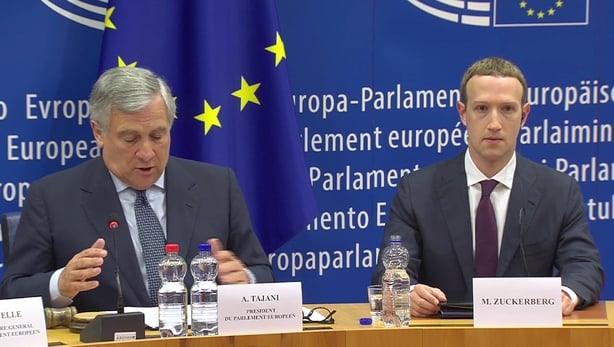Facebook boss Mark Zuckerberg has apologised to members of the European Parliament for a massive data leak, in his latest attempt to draw a line under a scandal that has rocked the world's biggest social media network.
Mr Zuckerberg agreed to meet leaders of the European Parliament to answer questions about how political consultancy Cambridge Analytica improperly got hold of the personal data of 87 million Facebook users, including up to 2.7 million in the EU.
In his opening remarks, Mr Zuckerberg said it had "become clear over the last couple of years that we haven't done enough to prevent the tools we've built from being used for harm as well."
"Whether it's fake news, foreign interference in elections or developers misusing people’s information, we didn’t take abroad enough view of our responsibilities. That was a mistake, and I’m sorry."
His comments, sitting at a circular table with EU Parliament leaders, dressed in a suit, tie and white shirt, echo an apology last month to US politicans.
But questions remain over how Facebook let the leak happen and whether it is doing enough to prevent a recurrence.
Mr Zuckerberg's appearance in Brussels comes three days before tough new EU rules on data protection take effect. Companies will be subject to fines of up to 4% of global turnover for breaching them.
In the session, Manfred Weber, leader of the centre-right in the European Parliament and an ally of German Chancellor Angela Merkel, asked Mr Zuckerberg why Facebook should not be broken up as a monopoly.
Mr Zuckerberg declined to answer specific questions on the cross-use of data from Facebook, its WhatsApp messaging service which has more than one billion daily users, and the blocking of target ads.
As he did with a series of questions from US politicans last month, Mr Zuckerberg said he would send follow-up answers later.
We need your consent to load this rte-player contentWe use rte-player to manage extra content that can set cookies on your device and collect data about your activity. Please review their details and accept them to load the content.Manage Preferences
DUP MEP Diane Dodds raised the case of 17-year-old Ronan Hughes from Co Tyrone, who took his own life in 2015 after online blackmailers tricked him into sending them intimate pictures of himself.
"This is only one example of the rise of false accounts within Facebook," she said.
"I would like you to tell us today what you are doing to stop the rise of false Facebook accounts which deliberately target young and vulnerable people."
The format of the session in Brussels - which saw MEPs make statements and pose questions to Mr Zuckerberg, with the Facebook chief responding to their comments at the end - drew criticism for allowing the tech entrepreneur to escape without giving full answers.
Responding to the MEPs, Mr Zuckerberg said: "The bottom line here is that hate speech, bullying, terror, violence - all this content has no place on our services.
"But in order to really execute that we need to upgrade and do a better job of executing our policies."
He said the firm was making greater use of artificial intelligence to detect offensive content.
Facebook will be compliant with GDPR rules - Zuckerberg
Mr Zuckerberg said Facebook expected to be compliant with the EU rules, called the General Data Protection Regulation, when they come into force on 25 May, stressing the company's commitment to Europe where it will employ 10,000 people by the end of the year.
"I believe deeply in what we're doing. And when we address these challenges, I know we'll look back and view helping people connect and giving more people a voice as a positive force herein Europe and around the world," he said.
Mr Zuckerberg's appearance produced little new information about Facebook's operations.
He repeated points he previously made to US politicians about Facebook's plans to hire more staff and to try to develop artificial intelligence to catch hate speech and other banned material.
He avoided giving details about how non-Facebook users could stop the company from collecting their data, changing the subject to the company's relationship with third-party apps.
Last month, Facebook said it had no plans to build a tool to allow non-users to find out what the company knows about them, something that US politicans had asked about.

Since the Cambridge Analytica scandal, Facebook has suspended 200 apps from its platforms as it investigates third-party apps that have access to large quantities of user data.
Cambridge Analytica and its British parent, SCL Elections Ltd, have declared bankruptcy and closed down.
Mr Zuckerberg said investments in security would significantly impact Facebook's profitability, but "keeping people safe will always be more important than doubling our profits."
Some European officials want a tougher line on big technology firms, however.
Facebook's compliance with the new EU data rules will be closely watched, as will its efforts to tackle the spread of fake news ahead of European Parliamentary elections next year.
"Some sort of regulation is important and inevitable," Mr Zuckerberg said, but he echoed calls in the United States that innovation should not be stifled.
"The important thing is ...to make sure that we have regulatory frameworks that help protect people that are flexible so that they allow for innovation," he said.
After plunging when the data leak scandal broke in March, Facebook shares have recovered, helped by stronger-than-expected quarterly results.
Mr Zuckerberg will go on to meet French President Emmanuel Macron tomorrow but has so far declined to appear in front of British politicans.

